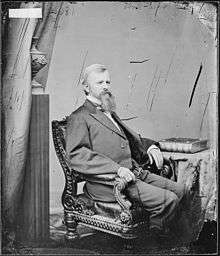Amasa Cobb
| Amasa Cobb | |
|---|---|
 | |
| Member of the U.S. House of Representatives from Wisconsin's 3rd district | |
|
In office March 4, 1863 – March 3, 1871 | |
| Preceded by | A. Scott Sloan |
| Succeeded by | J. Allen Barber |
| Member of the Wisconsin State Assembly | |
|
In office 1860-1863 | |
| Member of the Wisconsin Senate | |
|
In office 1855 | |
| Personal details | |
| Born |
September 27, 1823 Crawford County, Illinois |
| Died |
July 5, 1905 (aged 81) Los Angeles, California |
| Political party | Republican |
| Military service | |
| Allegiance |
United States of America Union |
| Service/branch |
United States Army Union Army |
| Rank |
|
| Battles/wars | American Civil War |
Amasa Cobb (September 27, 1823 – July 5, 1905) was a Republican Wisconsin politician and an officer in the Union Army during the American Civil War.
Biography
Born in Crawford County, Illinois, near Palestine, Illinois,[1][2] Cobb moved to the Wisconsin Territory in 1842 and mined for lead. He served in the Mexican-American War as a private. After the war he studied law, passed the bar and set up practice in Mineral Point, Wisconsin. He was a district attorney from 1850 to 1854, then was elected to the Wisconsin State Senate in 1855, serving until 1856. During his term, he was also the adjutant general of Wisconsin from 1855 to 1858. He became a member of the Wisconsin State Assembly in 1860 and served as speaker in 1861.[3]
At the outset of the Civil War, on July 12, 1861,[1] he joined the Union army as Colonel of the 5th Wisconsin Infantry Regiment, serving in the Army of the Potomac in several campaigns and battles. Most notably, Cobb succeeded Brigadier General Winfield S. Hancock in command of a brigade in second division VI Corps at the Battle of Antietam, after Hancock was transferred to command the first division II Corps. In the fall of 1862, he was elected to the 38th Congress from Wisconsin's 3rd congressional district for a two-year term.[1][2] Cobb was reelected to the 39th, 40th, and 41st Congresses, serving until 1871.[1][2] His last action with 5th Wisconsin Infantry was the Battle of Fredericksburg.
Despite being a sitting Representative in the United States House of Representatives, he resumed his military career on September 29, 1864, when he was named as Colonel of the newly raised 43rd Wisconsin Infantry Regiment.[1] After arriving at Nashville, Tennessee in October, Cobb and his regiment guarded the important supply and railroad depot at Johnsonville in Benton County, Tennessee on the Tennessee River. On November 4, Cobb's men fought off an attack by John Bell Hood's Confederates led by Major General Nathan Bedford Forrest in the Battle of Johnsonville. For the rest of the war, the regiment was positioned in various parts of Tennessee to guard railroads and supply routes, and Cobb briefly commanded a brigade under Major General Robert H. Milroy. He and his men were mustered out of the service on June 24, 1865[1] in Nashville before returning to Wisconsin and civilian life.
On January 13, 1866, President Andrew Johnson nominated Cobb for appointment to the grade of brevet brigadier general of volunteers to rank from March 13, 1865 for his distinguished services at the Battles of Williamsburg, Golding's Farm, Virginia during the Seven Days Battles and Antietam,[2] and the United States Senate confirmed the appointment on March 12, 1866.[1][4] After the war, Cobb became a member of the Military Order of the Loyal Legion of the United States.
In 1871, Cobb moved to Lincoln, Nebraska, where he started to practice law again. He was appointed mayor of Lincoln in 1873, and then became associate justice of the Nebraska Supreme Court in 1878 to 1892. The last four years, from 1888 to 1892, he served as Nebraska's chief justice.
Amasa Cobb died in Los Angeles, California on July 5, 1905.[1][2] He was buried in Wyuka Cemetery, Lincoln, Nebraska.[1][2]
See also
Notes
- 1 2 3 4 5 6 7 8 9 Eicher, John H., and David J. Eicher, Civil War High Commands. Stanford: Stanford University Press, 2001. ISBN 0-8047-3641-3. p. 177.
- 1 2 3 4 5 6 Hunt, Roger D. and Jack R. Brown, Brevet Brigadier Generals in Blue. Gaithersburg, MD: Olde Soldier Books, Inc., 1990. ISBN 1-56013-002-4. p. 118.
- ↑ Amasa Cobb, Wisconsin Historical Society
- ↑ Eicher, 2001, p. 742.
References
- Eicher, John H., and David J. Eicher, Civil War High Commands. Stanford: Stanford University Press, 2001. ISBN 0-8047-3641-3.
- Hunt, Roger D. and Jack R. Brown, Brevet Brigadier Generals in Blue. Gaithersburg, MD: Olde Soldier Books, Inc., 1990. ISBN 1-56013-002-4.
- This article incorporates facts obtained from: Lawrence Kestenbaum, The Political Graveyard
- United States Congress. "Amasa Cobb (id: C000543)". Biographical Directory of the United States Congress. Retrieved on 2008-02-12
- "The Political Graveyard". Cobb, Amasa. Archived from the original on 22 December 2005. Retrieved January 10, 2006.
- "Congressional Bioguide". Cobb, Amasa. Retrieved January 10, 2006.
Further reading
- Nelson, Meredith K., "Amasa Cobb." Nebraska Law Bulletin 14 (November 1935): pages 197-213.
External links
| United States House of Representatives | ||
|---|---|---|
| Preceded by A. Scott Sloan |
Member of the U.S. House of Representatives from Wisconsin's 3rd congressional district March 4, 1863 - March 3, 1871 |
Succeeded by J. Allen Barber |
| Political offices | ||
| Preceded by Samuel W. Little |
Mayor of Lincoln 1875 - 1876 |
Succeeded by Robert D. Silver, Jr. |